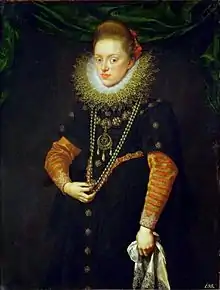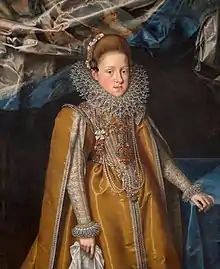| Maria Anna of Bavaria | |
|---|---|
 | |
| Archduchess consort of Inner Austria | |
| Tenure | 26 August 1571 – 10 July 1590 |
| Born | 21 March 1551 Munich, Duchy of Bavaria |
| Died | 29 April 1608 (aged 57) Graz, Archduchy of Austria |
| Spouse | |
| Issue |
|
| House | Wittelsbach |
| Father | Albert V, Duke of Bavaria |
| Mother | Anna of Austria |
| Religion | Roman Catholicism |
Maria Anna of Bavaria (German: Maria Anna von Bayern) (21 March 1551, Munich – 29 April 1608, Graz) was a politically active Archduchess of Austria by her marriage to Archduke Charles II of Austria. She played an important role in the Counter-Reformation in Austria.
Life
Maria Anna was a daughter of Albert V, Duke of Bavaria and Anna of Austria.[1] She was given an elementary education in Latin and religion but a high education in music, likely by Orlando di Lasso.
On 26 August 1571 in Vienna, the 20-year-old Maria Anna married her maternal uncle Charles II of Austria.[1] The marriage was arranged to give Austria political support from Bavaria and Bavaria an agent in Vienna.
The relation between Maria Anna and Charles was described as good, and the couple had 15 children in just 18 years. Maria Anna was described as confident, ambitious and a great lover of pomp and power, but foremost a devout Catholic. She participated in affairs of state and successfully benefited a powerful counter reformation in the domains of her spouse. She continued her education in music, benefited the Jesuit school in Graz, and spent her time in worship and religious charity.
Maria Anna was widowed in 1590, but she continued to participate in politics as an advisor to her son and encouraged him to continue the Counter-Reformation and work against the Protestant clergy and nobility.
In 1608, she retired to the Nunnery of St Clare in Graz.
Her correspondence is partially preserved.
Issue
| Name | Picture | Birth | Death | Notes |
|---|---|---|---|---|
| Archduke Ferdinand | Judenburg, 15 July 1572 | Judenburg, 3 August 1572 | Died in infancy. | |
| Archduchess Anna |  | Graz, 16 August 1573 | Warsaw, 10 February 1598 | Married on 31 May 1592 to Sigismund III Vasa, King of Poland, Grand Duke of Lithuania and King of Sweden.[1] |
| Archduchess Maria Christina |  | Graz, 10 November 1574 | Hall in Tirol, Tyrol, 6 April 1621 | Married on 6 August 1595 to Sigismund Bathory, Prince of Transylvania; they divorced in 1599. |
| Archduchess Catherine Renata |  | Graz, 4 January 1576 | Graz, 29 June 1599 | Died unmarried. |
| Archduchess Elisabeth | Graz, 13 March 1577 | Graz, 29 January 1586 | Died in childhood. | |
| Archduke Ferdinand | .jpg.webp) | Graz, 9 July 1578 | Vienna, 15 February 1637 | Holy Roman Emperor as Ferdinand II in 1619.[1] |
| Archduke Charles | Graz, 17 July 1579 | Graz, 17 May 1580 | Died in infancy. | |
| Archduchess Gregoria Maximiliana |  | Graz, 22 March 1581 | Graz, 20 September 1597 | Died unmarried. |
| Archduchess Eleanor |  | Graz, 25 September 1582 | Hall in Tirol, Tyrol, 28 January 1620 | Died unmarried. |
| Archduke Maximilian Ernest |  | Graz, 17 November 1583 | Graz, 18 February 1616 | Teutonic Knight. |
| Archduchess Margaret |  | Graz, 25 December 1584 | El Escorial, 3 October 1611 | Married on 18 April 1599 to Philip III, King of Spain.[1] |
| Archduke Leopold |  | Graz, 9 October 1586 | Schwaz, 13 September 1632 | Archduke of Further Austria and Count of Tirol under the name Leopold V.[1] |
| Archduchess Constance |  | Graz, 24 December 1588 | Warsaw, 10 July 1631 | Married on 11 December 1605 to Sigismund III Vasa, King of Poland and Grand Duke of Lithuania (widower of her older sister). |
| Archduchess Maria Magdalena |  | Graz, 7 October 1589 | Passau, 1 November 1631 | Married on 19 October 1608 Cosimo II de' Medici, Grand Duke of Tuscany. |
| Archduke Charles |  | Graz, 7 August 1590 | Madrid, 28 December 1624 | Bishop of Wroclaw and Brixen (1608–24), Grand Master of the Teutonic Order (1618–24). |
Ancestry
Bibliography
- HAMANN, Brigitte, Die Habsburger: Ein Biografisches Lexicon (Munich: Piper, 1988).
- Parker, Geoffrey (1987). The Thirty Years' War. Military Heritage Press.
- SÁNCHEZ, Magdalena, (2000) A Woman's Influence: Archduchess Maria of Bavaria and the Spanish Habsburgs. In C. Kent, T.K. Wolber, C.M.K. Hewitt (Eds.) The lion and the eagle: interdisciplinary essays on German-Spanish relations over the centuries (pp. 91–107). New York: Berghahn Books.
References
- 1 2 3 4 5 6 Parker 1987, p. 3.
- ↑ Rall, Hans (1953), "Albrecht IV.", Neue Deutsche Biographie (in German), vol. 1, Berlin: Duncker & Humblot, p. 157; (full text online)
- 1 2 Riezler, Sigmund Ritter von (1897), "Wilhelm IV.", Allgemeine Deutsche Biographie (in German), vol. 42, Leipzig: Duncker & Humblot, pp. 705–717
- ↑ Rall, Hans (1953), "Albrect III.", Neue Deutsche Biographie (in German), vol. 1, Berlin: Duncker & Humblot, p. 156; (full text online)
- 1 2 Goetz, Walter (1953), "Albrecht V.", Neue Deutsche Biographie (in German), vol. 1, Berlin: Duncker & Humblot, pp. 158–160; (full text online)
- 1 2 Wurzbach, Constantin von, ed. (1860). . Biographisches Lexikon des Kaiserthums Oesterreich [Biographical Encyclopedia of the Austrian Empire] (in German). Vol. 6. p. 265 – via Wikisource.
- 1 2 3 4 Brüning, Rainer (2001), "Philipp I.", Neue Deutsche Biographie (in German), vol. 20, Berlin: Duncker & Humblot, p. 372; (full text online)
- 1 2 Dotterweich, Helmut (1962). Der junge Maximilian: Jugend und Erziehung des bayerischen Herzogs und späteren Kurfürsten Maximilian I. von 1573 bis 1593 [The Young Maximilian: Youth and Education of the Bavarian Duke and Later Elector Maximilian I from 1573 to 1593]. R. Pflaum. p. 188. Retrieved 28 August 2018.
- 1 2 Philip I, King of Castile at the Encyclopædia Britannica
- ↑ Ferdinand I, Holy Roman Emperor at the Encyclopædia Britannica
- 1 2 Charles V, Holy Roman Emperor at the Encyclopædia Britannica
- 1 2 Wurzbach, Constantin von, ed. (1860). . Biographisches Lexikon des Kaiserthums Oesterreich [Biographical Encyclopedia of the Austrian Empire] (in German). Vol. 6. p. 151 – via Wikisource.
- 1 2 Chisholm, Hugh, ed. (1911). . Encyclopædia Britannica. Vol. 15 (11th ed.). Cambridge University Press.
- 1 2 Casimir IV, King of Poland at the Encyclopædia Britannica
- 1 2 Obermayer-Marnach, Eva (1953), "Anna Jagjello", Neue Deutsche Biographie (in German), vol. 1, Berlin: Duncker & Humblot, p. 299; (full text online)
- 1 2 Noubel, P., ed. (1877). Revue de l'Agenais [Review of the Agenais] (in French). Vol. 4. Société des sciences, lettres et arts d'Agen. p. 497.
- http://www.nad.riksarkivet.se/sbl/Presentation.aspx?id=18720
- http://de.wikisource.org/wiki/ADB:Maria_(Erzherzogin_von_%C3%96sterreich)
- http://de.wikisource.org/wiki/BLK%C3%96:Habsburg,_Maria_von_Bayern